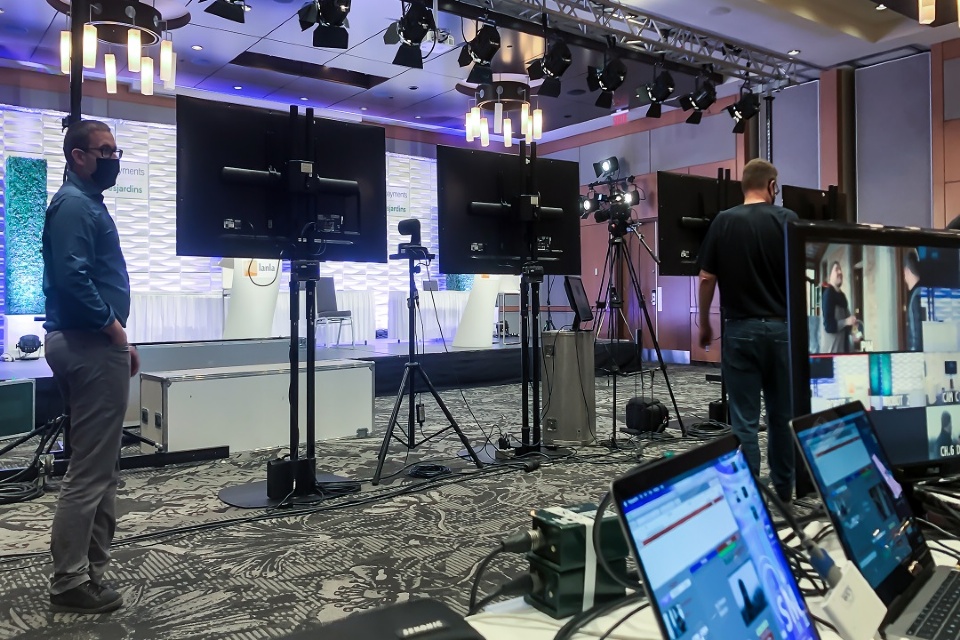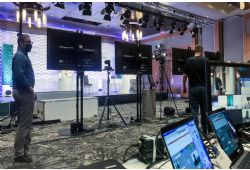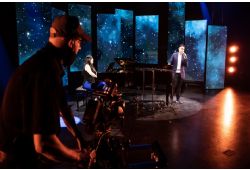As the world still grapples with the COVID-19 pandemic, Laval Families Magazine chatted with Archie Cifelli, Founder of Lighting Sound Multimedia, to discuss the impact of the past year on the special event industry.
Q: After almost a year of COVID-19, how does the special event industry respond?A: When confinement was announced, both the clients and the industry were caught off guard. Most clients decided to postpone their communication and marketing plans while the few that wanted to move forward found themselves flying blind. Obviously, some suppliers were already offering web-based events but most often these services did not align themselves with the needs or expectations of the clients. And way too many clients and suppliers tried to just have a “normal” event but online…which was, in most cases, not great.By Fall, however, the marketing teams had a much clearer understanding of what it takes to convey their message online and the suppliers best positioned to respond were the ones with some experience in broadcast television and a deep understanding of web services.Right now, and for the foreseeable future…any company wanting to reach out and communicate with their workforce has to do it via web platforms; it’s the new reality.Q: What are the most important things a client must look at in order to produce a virtual event?
A: Obviously, this varies from client to client but there are some general rules to follow.
- Don’t make your event like a Zoom meeting.
- Don’t try to make your event like a classic show.
- Remember that people lose interest after more than 60 minutes, so keep it short and to the point.
- Make it visually interesting and dynamic.
- Remember that internet is not live…ask about the meaning of “latency”, especially if you are insisting on interaction between “audience” and “performers”.
A: A hybrid event is a mix of “audience” and “digital” and it poses several challenges which obviously impact production budgets and technical specifications. Having an audience requires more staging, more audio, different lighting to start with…but moreover, it also offers limitation with regards to specific placement of production equipment. Anyone who’s even seen how a TV show is produced knows that what is “not seen” on camera can be quite a mess! I very much believe in the no live audience “tv show” approach. It’s far more cost-effective for the client and much easier to put together. Obviously, there are instances when an audience is vital…ask any stand-up comic that tried to do a virtual show.Q: So, what are the technical requirements to put on a good virtual business event?
A: Well, I think that the number one consideration still has to be safety protocols, and while this may seem a given, imagine a client wanting to do a 10-person panel…that would mean a 30-meter space just to have the panel! Not only does this require a huge space but it would look really horrible on camera. So, it’s important that any client wanting to do a virtual event be open to change and willing to set past experience aside.So, to answer your question, a good event is short, moderated by engaging and dynamic people and very natural…ideally loosely scripted so as not to appear to “monolithic”. Finally, but importantly, supported with nice graphics and/or pre-recorded videos. I personally have a love of “talk show” style presentations, where a moderator sits and interviews his/her guests that discuss the topics at hand while another person looks at written questions coming in on the platform and interjects to ask on behalf of the writer. This is simple, very cost-effective and a great way to weed out questions/comments.Q: What does this type of even require from a technical standpoint?
A: That’s a great question. A vital part of a webcast is a stable and dedicated internet service. This is probably the #1 reason for so many events crashing…lack of understanding on the part of the supplier of bandwidth usage. Once the internet service is settled, obviously a secure and efficient delivery platform for the event is needed. This is the “website” where people go to see the event. This is also often overlooked by less experienced suppliers.After that, it’s all about the studio space in place of an actual production studio: noise levels, ambient light, set decoration and all the tech stuff that make a great event. I never ever do a webcast with less than four cameras nor do I do it with classic stage lights. In the end, we are doing a TV show. That’s how I approach it.Q: Do you have a recommendation for anyone wanting to put on a web event?
A:Well, my first and foremost recommendation is make sure your supplier is up to the challenge. Right now, so many A/V companies are jumping on the web bandwagon and it’s cluttering the marketplace. A lot of them are sitting on a lot of live event equipment and trying to re-task their inventory towards this market. This can seem like a good plan, but it rarely is.A client should ask their potential supplier about their webcast portfolio and service platform and then judge if the supplier can meet their needs. Then and only then should they commit to a partnership. Communications are not something to take lightly.Q: What sets LSM apart from the rest?
A: Well, LSM was already in the webcast game before COVID-19 hit. So, although the needs of clients have changed dramatically, the technical and logistical side of it is well in hand. This is specifically true with the LSM DIGITAL studios (Montreal, St-Hyacinthe, Quebec) that are full-featured, state-of-the-art production spaces ready to go for webcasting events. LSM also owns a fully mobile production inventory for those clients who would rather produce from their own facility or a specific venue, all of which are managed by some of the most experienced and resourceful people in the industry…a recipe for success!

 In The Latest Issue:
In The Latest Issue:



 BY:
BY: 



Tweet
Share